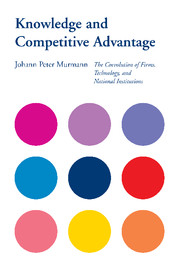Book contents
- Frontmatter
- Contents
- Series Editors' Preface
- Author's Preface
- Acknowledgments
- Timeline of Key Events in Development of the Synthetic Dye Industry before 1914
- CHAPTER 1 Introduction
- CHAPTER 2 Country-Level Performance Differences and Their Institutional Foundations
- CHAPTER 3 Three Times Two Case Studies of Individual Firms
- CHAPTER 4 The Coevolution of National Industries and Institutions
- CHAPTER 5 Toward an Institutional Theory of Competitive Advantage
- Appendixes
- Bibliography
- Index
Author's Preface
Published online by Cambridge University Press: 06 August 2009
- Frontmatter
- Contents
- Series Editors' Preface
- Author's Preface
- Acknowledgments
- Timeline of Key Events in Development of the Synthetic Dye Industry before 1914
- CHAPTER 1 Introduction
- CHAPTER 2 Country-Level Performance Differences and Their Institutional Foundations
- CHAPTER 3 Three Times Two Case Studies of Individual Firms
- CHAPTER 4 The Coevolution of National Industries and Institutions
- CHAPTER 5 Toward an Institutional Theory of Competitive Advantage
- Appendixes
- Bibliography
- Index
Summary
Synthetic dyes represent the first time when a scientific discovery quickly gave rise to a new industry. In 1856, the nineteen-year-old William Henry Perkin serendipitously invented the first synthetic dye and successfully commercialized his discovery. Perkin, along with entrepreneurs from Britain and France, dominated the synthetic dye industry for the next eight years. Contrary to contemporary predictions, however, these firms were not able to sustain their leadership position in the new industry. By 1870, Germany had about 50 percent of the global synthetic dye market; Britain fell to second place. By 1900, Germany's worldwide share climbed to as high as 85 percent, where it stayed with relatively minor fluctuations until World War I. In the 1860s, American firms tried to be successful participants in the U.S. market, but they could not compete with German and Swiss firms before World War I and remained relatively small players or went out of business.
Adam Smith (1776) and David Ricardo (1817) and more recently Michael Porter (1990) and David Mowery and Richard Nelson (1999) are prominent examples of a wide array of social scientists who have tried to identify the factors that lead nations and firms to prosper. This book follows that tradition. In tracing the development of one industry within the context of three countries – Great Britain, Germany, and the United States – during the period from 1857 to 1914, I attempt to make a contribution toward formulating a much-needed dynamic theory of industrial leadership.
- Type
- Chapter
- Information
- Knowledge and Competitive AdvantageThe Coevolution of Firms, Technology, and National Institutions, pp. xiv - xvPublisher: Cambridge University PressPrint publication year: 2003



